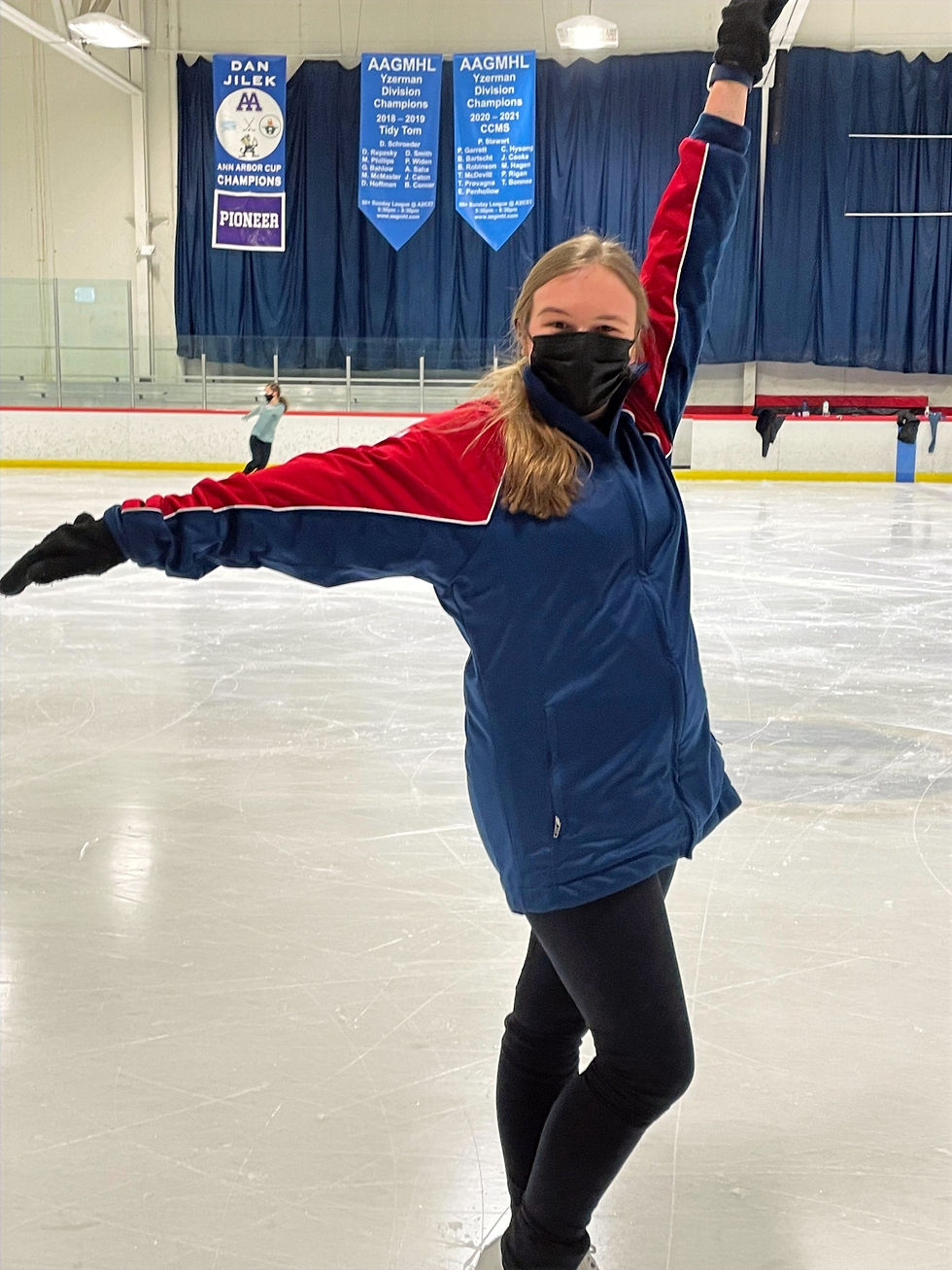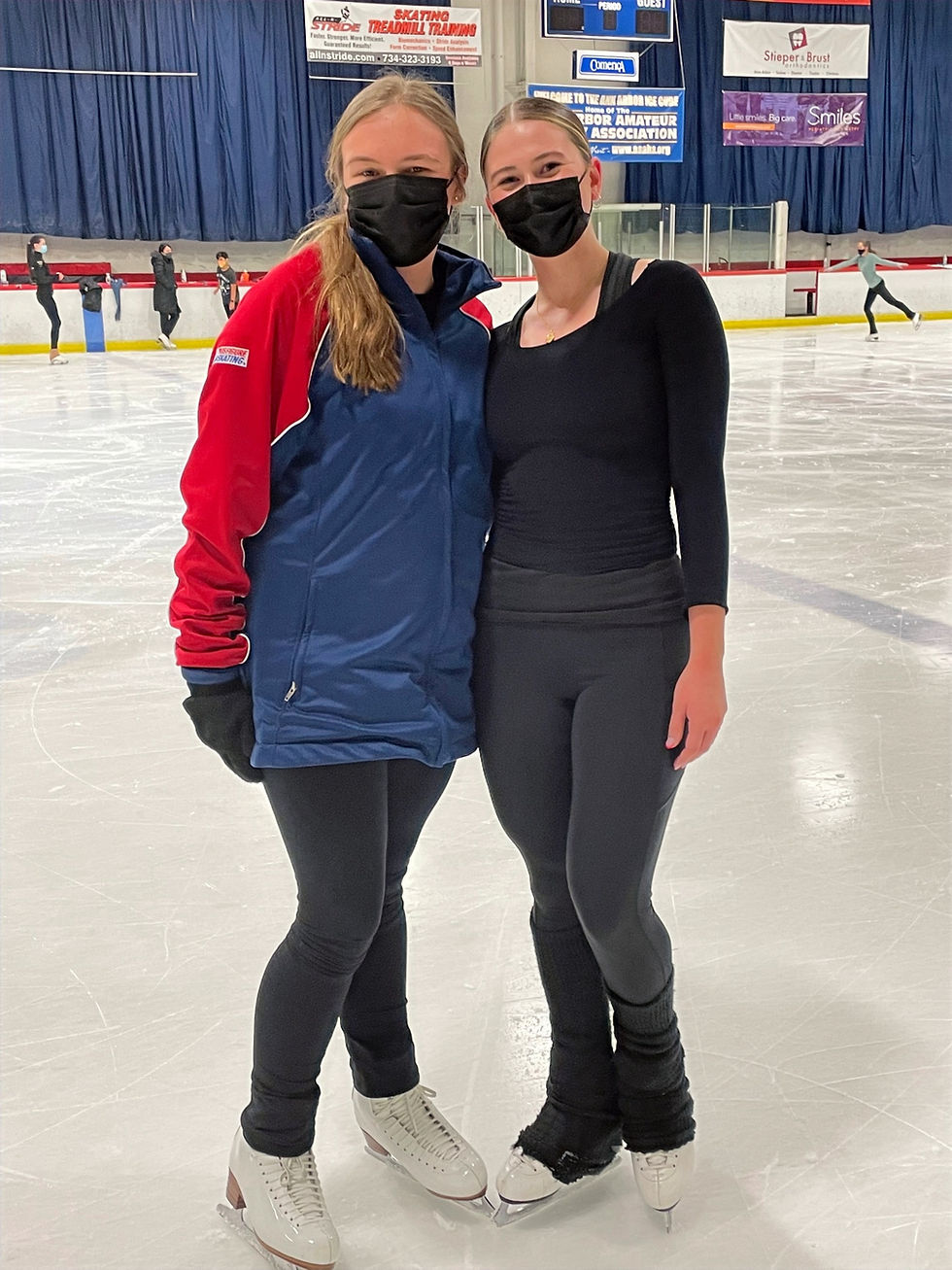The Hockettes: A Unified Skating Team
- Denise Fisher
- Jun 28, 2022
- 4 min read

Synchronized ice skating is a sport with its roots in the Ann Arbor Figure Skating Club. In the 1950s, Dr. Richard Porter had a vision of a team that would embody many important elements of a successful sport for girls. Now open to all genders, this sport requires that each member have the highest level of connection, trust, and confidence in one another to create the beautiful execution of gliding on ice in pure precision. Placing the needs of the overall team first demands that all athletes have qualities of commitment, perseverance, and forgiveness. It is critical that skaters have a support system including coaches, peers, and family members to foster the success and accomplishments of the entire team.
The success of a synchronized ice skating team demands maximum commitment with complete acceptance of the results. Many elements factor into the overall performance and judging results at any given time. Pure dedication is on display in every performance given by these amazing teams.
Youth growing up with disabilities often struggle with self-acceptance, confidence in their abilities, and self-esteem. Finding a place of accomplishment and belonging can be difficult. The Hockettes is a unified team from Ann Arbor, Michigan, that has embraced the idea that anyone can contribute to the success of a synchronized ice skating team. This is a team of adaptive and non-disabled synchronized skaters who are peer mentors. They recently completed their fourth season of competitive skating and have performed at a variety of shows and competitions. This unified team was invited for a special performance at the World Synchronized Skating Championship in 2020, which was unfortunately canceled due to the pandemic. They were scheduled to perform an exhibition to highlight the unique nature of this successful, inclusive team.
Mary Johanson is a coach from the Ann Arbor Figure Skating Club. She had been a coach for 35 years when she was presented with students with disabilities who enrolled in the Learn to Skate program. She says that she had no prior knowledge or experience working with people with disabilities and has developed a lot of her adaptive teaching skills by learning from her students. This grew into the Adaptive Skating Program and a Special Olympics team. Eventually, four skaters from Michigan qualified for the World Games as Special Olympians. This led to Johanson’s involvement with US Figure Skating and working on behalf of skaters with disabilities at the national level.

Coach Johanson calls her involvement in developing this program a “happy accident.” Her commitment and passion have been instrumental in helping students with disabilities all over the country who aspire to skate. Additionally, adaptive skating is now an integral part of the Professional Skaters Association, an organization to which all skating coaches are required to belong.
Grace Learns to Skate
Grace is a nineteen-year-old woman who has struggled to find adaptive sports programs through her school connections. In her early elementary years, when her brother began to skate and play hockey, Grace found that no skating programs were available for children with disabilities. By the time she was twelve, Coach Johanson had begun including adaptive skaters in her new program. Grace started her journey with her friend Alex, and together, they continued to become Special Olympians. Their travels have included competing in Austria and Iceland and winning Gold medals!

With the subsequent development of the Unified Hockettes team, Grace was able to continue with her skating dreams. She described “feeling so excited” when she was chosen for the synchronized team. Erin Donovan has been the director and coach of the Hockettes Synchronized Skating Program since 2002. She began the first unified team in 2018. Since being part of the team, Grace expresses that she feels very energetic and strong and values the support she receives from her teammates. Her mother, Marie, reports that Grace was unable to ride a bicycle prior to learning to skate. By the time she was thirteen and had participated in the Learn to Skate program, she had mastered this skill.
The overall improvement in her core stability, balance, body awareness, and ability to plan and execute accurate movements has carried over into all aspects of her life. Both Grace and her mother report that the benefits from team skating are invaluable. Grace credits her coaches, including both individual and team coaches, for “helping me on the inside and supporting others to be successful.”
Emma Mentors Her Peers on the Ice
Emma is a skater who is on the highly competitive Junior Hockettes team. Emma’s team coach, Erin Donovan, invited her to become a part of the unified team as a peer mentor. She had seen the girls at one of the competitions and became interested in working with them to improve their skills and help them to build team accomplishments.

In her role as a peer mentor, Emma helps the girls who experience challenges with warming up and learning to sequence the steps. She talks with them and finds creative ways to guide them to learn a new program. Emma considers mentoring others a normal part of the sport, as is done in any other professional experience. She and the other mentors offer encouragement and support, guiding without unrealistic expectations or judgment. With involvement on this team, success on the ice in the traditional sense is not the most important accomplishment.
“Ninety percent of the time, we are not competing. It’s not about winning. The ten percent of the time that we are competing, the focus remains on how the girls feel about their experiences,” states Emma, who places a high value on helping others and enjoys doing this through adaptive skating. She describes her involvement as fun and familial with the other skaters and families. Although Emma does not aspire to become a professional coach, she does want to make an impact by helping others through her hard work. She is considering getting a college degree in the medical field after her high school graduation.
Life Lessons in the Rink

Both Grace and Emma have tremendous respect for their coaches. They feel supported and appreciate that the coaches create an extremely positive environment. Even when the team doesn’t perform their best, a sense of community and overcoming fear often become the most meaningful lessons of the event.
For more information about the adaptive skating programs and the Unified Hockettes Synchronized Team, please contact Mary Johanson at coachmaryjohanson@gmail.com or Erin Donovan at coacherindonovan@gmail.com.
